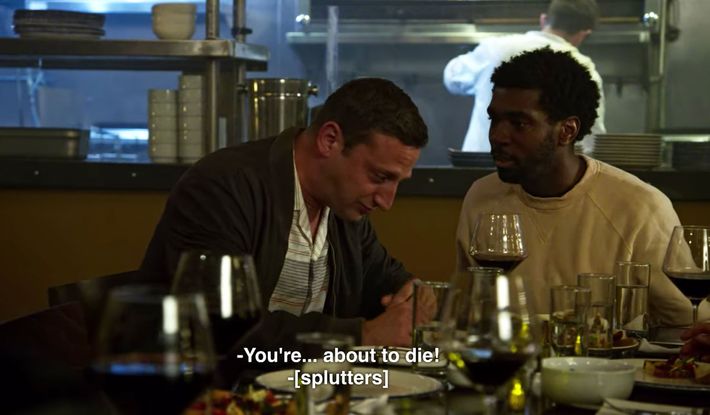
On the evening of January 6, the day of the storming of the U.S. Capitol, comedian and Desus & Mero writer Josh Gondelman tweeted, “I am furious at this news cycle for turning the Tim Robinson hot dog car sketch into political comedy.” Chances are you’ve seen a meme from the sketch to which he’s referring. It’s a moment from I Think You Should Leave, the hit sketch show from Detroiters creator and ex-SNL writer Tim Robinson that premiered on Netflix in 2019. The meme has become internet shorthand for anybody who refuses to acknowledge the consequences of their own actions, which, of course, means it’s mostly used to reference politics. Even actual politicians have used it: In December 2020, Representative Ilhan Omar posted it to highlight the irony of ExxonMobil tweeting about climate change. By the time Gondelman tweeted about it — after a slew of speeches in which pro-Trump politicians attempted to thread the needle between not being tried for treason and not pissing off their constituents, some of whom stormed the Capitol essentially at their behest — the hot-dog sketch felt more politically relevant than ever.
The sketch finds Robinson’s character attempting to alternately cajole and litigate a group of angry people into not being angry with him. In this case, a hot dog-shaped car has crashed into a building, and the people inside naturally identify Robinson, dressed as a hot dog, as the driver. Robinson’s character cycles through the greatest hits of a desperate person avoiding accountability: leading the investigation of the crime, pointing fingers at the others, changing the subject, making emotional appeals, and finally, giving an impassioned if slightly rambling speech about the alienation of modern American culture and rise of streaming pornography websites, while he steals a bunch of suits. When the cops finally attempt to apprehend him, knowing he has no more time to stall, he switches on a dime from his self-righteous moral posturing to hostility, flipping off the cops as he flees. Does this behavior remind you of anyone?
There is nothing in I Think You Should Leave that is overtly political. It’s probably the least topical sketch show of the Trump era. Many of its sketches were conceived during Robinson’s tenure as an SNL writer years before Trump’s first political campaign, let alone his presidency. I don’t think you need to read a political dimension into the show to enjoy it, and I certainly don’t think the creators of the show intended for it to be read this way. But do I think one reason the show has resonated so deeply with its fans, one reason it felt like such a breath of fresh air in a stagnating medium, and the reason its characters have had a second life in the Twitter replies of American politicians, is because of the way its absurdism echoes the absurdity of this horrific situation in which we’ve found ourselves. Unlike a late-night monologue joke about the latest controversy, I Think You Should Leave memes are eternally relevant, distilling the issue of the day down to its stupid, petty, venal core.
So many of the scenarios in I Think You Should Leave work as metaphors for the political climate in general, and for Trump’s idiosyncrasies in particular. Critics of Trump-era comedy often say Trump is an impossible person to parody because he is already such a parody of an arrogant, insecure man as it is. It makes sense that many of his traits would show up in a sketch comedy, even if lampooning him was not the intent. Several I Think You Should Leave sketches start off with a stock premise — a commercial for a legal firm or a medication for back pain — then devolve into chaos as Robinson’s character addresses a very specific personal grievance against someone who has wronged him: prank-playing plumbers, for example, or a scamming recording studio engineer. Shortly before the storming of the Capitol on January 6, Trump gave a speech to his supporters, some of whom would die hours later in an attempt to keep him in power. In that speech, he opined, apropos of nothing, that Oprah “used to like [him].” Comedy is about heightening, and you can’t raise the stakes on Robinson’s formula much higher than “the leader of the free world addresses an angry mob to discuss the fact that he had his feelings hurt by a talk-show host.”
Many of the sketches also involve Robinson attempting to avoid embarrassment or consequences through outright denial of reality, which feels uncomfortably reminiscent of how this past year has played out. The very first sketch of the show is the simplest articulation of the theme: Robinson pulls a door that he should have pushed. Rather than admit his mistake, he rips it from its hinges. When I think of all of the politicians who’ve denied the reality of the coronavirus pandemic, I don’t think of monologue jokes or Alec Baldwin. I think of the sketch immediately following the one with the hot dog car. In it, Robinson’s character attempts to save face in front of a fellow dinner guest he respects by refusing to admit he’s choking, even as his attempts at behaving normally get more and more deranged. I think of Robinson’s character in another sketch, standing at an award show podium, repeatedly denying that an audience member’s dog has humped his head, even when footage of the event is shown on the award show’s monitors. Maybe it would be inappropriate to say that America is getting its head humped by coronavirus in front of everyone, but I don’t think it’d be inaccurate.
There have been recent instances of incisive political comedy that have come through more immediately recognizable forms of satire than I Think You Should Leave. But many of the most effective recent political parodies, especially by up-and-coming comedians — like James Austin Johnson’s Trump railing against Scooby-Doo’s ineffectiveness as a crime fighter, or Rajat Suresh and Jeremy Levick lampooning coronavirus deniers by depicting an anti-masker rehashing an argument from When Harry Met Sally — seem much more influenced by the Robinson school of bizarro specificity than by, say, The Daily Show. It’s never been particularly useful to delineate between “smart” comedy and “dumb” comedy, but in these singularly stupid times, it often feels like there’s little point in attempting to refute, mock, or reason when you can just post “Oh my God, he admit it!” instead.
As the Trump presidency winds down (if you can call the events of the last few weeks “winding down”), critics are revisiting the cautious hope of 2016 that Trump as president would be good for comedy. The consensus is that the opposite turned out to be true. As a comedian myself, I identify with the way a recent Ringer article articulates the problem: “Comics were left with two options, both of them bad: Invoke [Trump] and throw their hats into an already absurdly crowded space, or ignore him and risk the opportunity to stay current — and to appear invested in the ongoing health of the nation.” I’d argue the way I Think You Should Leave has found a second life as a political metaphor represents a third option: As our country’s political discourse becomes more and more absurd, the conventional tools we have used in comedy to comment on and satirize it become less and less useful, and we need to get a little weird with it.
The Link LonkJanuary 15, 2021 at 01:23AM
https://ift.tt/2LAUqWL
Stupid Times Call for Stupid Jokes - Vulture
https://ift.tt/2BsGM2G
Joke

No comments:
Post a Comment